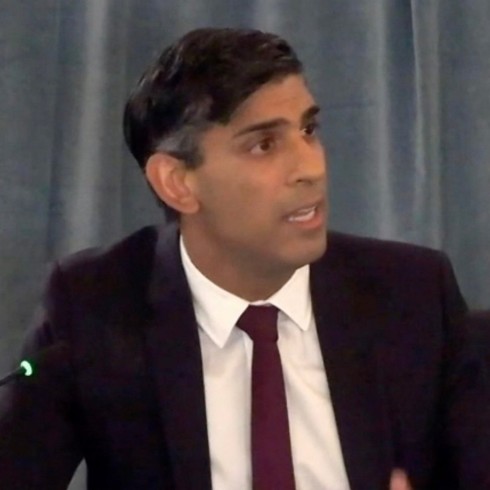Rishi Sunak defends UK’s delay on infected blood scandal compensation
Rishi Sunak was heckled on Wednesday as he defended the UK government’s delay in setting out a compensation scheme for victims of the infected blood scandal, insisting that it was working “as quickly as thoroughness allows” to right a “tragedy” spanning administrations.
The prime minister, giving evidence to the public inquiry into what has been dubbed the worst treatment disaster in the NHS’s history, resisted a request from Jenni Richards, counsel to the inquiry, that he rethink a decision to await publication of Sir Brian Langstaff’s final report before launching a payout scheme.
The review by Langstaff is expected in the autumn, but Richards noted that an interim report published in April “constitutes the [inquiry] chair’s complete recommendation on compensation”.
She suggested that this timetable “inevitably means further delay. And depending on how long the government then takes to consider the report, may then lead into a period . . . of [general] election purdah with all the policymaking constraints that imposes”.
In response, Sunak said Langstaff had at one point described his determination “to proceed as quickly as thoroughness allows. I think that is a good guide to how government should behave as well.”
“As a matter of general principle, good policymaking and legal advice would suggest it’s important for a government to have the full findings of an independent inquiry before making final decisions,” Sunak said later.
He added that everyone wanted to see as “swift [a] resolution to this tragedy as possible”, and that the Cabinet Office was “conducting an extensive amount of cross-government work to analyse all the various questions and recommendations” so ministers could act after receiving Langstaff’s final report.
“That work continues at pace,” he added, sparking ironic laughter among attendees at the hearing.

In May, the Financial Times reported that the compensation bill for those affected by the scandal could reach £10bn, in a further blow to the UK’s stretched public finances.
In the 1970s and 1980s, tens of thousands of Britons were infected with HIV and hepatitis C after receiving tainted blood transfusions from the NHS.
About 2,900 of those who received contaminated blood products mostly originating in the US at the height of the Aids epidemic are believed to have died between 1970 and 2019, according to figures released by the inquiry this week, although it acknowledged that there was “considerable uncertainty” around the estimate.
Pressed repeatedly on whether the government should have acted with more speed to address the scandal, Sunak said he could not comment on what previous administrations had done.
But he added: “The reassurance I hope people would take is . . . since I’ve been prime minister, which is just eight and a bit months, we’ve seen interim compensation payments made to 4,500 people, a significant sum of £100,000 [each].
“We have seen the moral case for compensation accepted for the first time in those 30 or 40 years, and we have seen a level of intensity of work on all the questions surrounding compensation that has not happened before.”
The compensation scheme is expected to require primary legislation. Asked whether it would be included in the King’s Speech scheduled for November 7, which will lay out the legislative agenda for the coming parliamentary session, Sunak said the issue of compensation was a personal priority but added: “I can’t speak to the composition of the [speech] for obvious reasons.”
This story originally appeared on: Financial Times - Author:Anna Gross



























